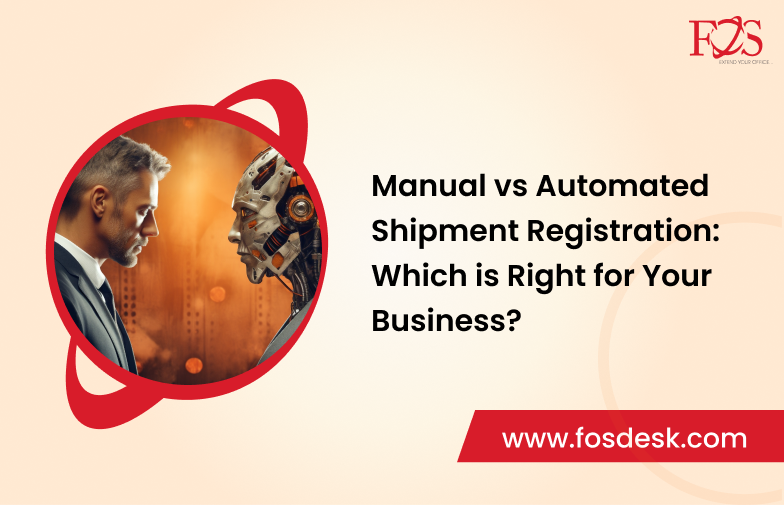Shipment registration might seem like just another task in the logistics process, but it plays a major role in how efficiently your operations run. Whether you’re managing a large import-export chain or working with third-party providers, how you register your shipments can impact everything from cost control to customer satisfaction.
If you’re a financial decision-maker or manager trying to decide between manual and automated shipment registration, this blog is for you. We’ll break it down with real-world examples, industry insights, and a personal tone to help you make the right call.
What is Shipment Registration?
Before diving into comparisons, let’s clear the basics. Shipment registration refers to the process of documenting, verifying, and entering details of goods being shipped. This includes information like:
- Origin and destination
- Type of cargo
- Carrier details
- Delivery timelines
- Costs and insurance
Traditionally, this was done manually, but with the rise of Logistics BPO services, automation has gained serious momentum.
The Traditional Manual Approach
Internal teams or outside logistics personnel usually conduct data entry in a manual system. They enter all cargo information into old software or spreadsheets. Manual procedures are labor-intensive and prone to mistakes, despite their seeming dependability.
Typographical errors, omitted entries, and misplaced documentation are inevitable when hundreds of shipment records are entered every day. This might work well for modest volumes. But it turns into a bottleneck when your company expands.
The Rise of Automation in Shipment Registration
With automated shipment registration, you’re using software solutions or outsourcing to Logistics BPO services that use automation tools. These systems can fetch data from emails, invoices, or integrated systems and instantly register shipments without human input.
Not only does this reduce errors, but it also saves your team a significant amount of time. You can also track shipments in real time and pull up historical data with just a few clicks.
Time Is Money: Speed Matters
One of the biggest advantages of automated systems is speed. According to a report by Deloitte, businesses using automated logistics systems saw a 60% reduction in processing time. That’s time you could use to focus on more strategic tasks.
On the other hand, manual entry takes more time and adds delays during high-volume seasons. If your logistics team is spending hours registering shipments, it might be time to upgrade.
Accuracy: The Hidden Cost of Mistakes
Manual systems are only as good as the person using them, let’s face it. A little error in the weight or destination of the cargo may result in problems with delivery, penalties, or even cargo being detained at ports.
Consistent and error-free entries are guaranteed by automation. Additionally, some systems are made to identify discrepancies or incomplete information before completing the registration.
Consider this: how much do mistakes cost you each year? If issues are fixed, automation might be well worth the investment.
Scalability: Can Your Process Grow with You?
When your business grows, your shipment volume increases too. Manual systems don’t scale well. You’ll need to hire more staff, conduct more training, and face growing data management challenges.
With automated systems or partnering with a Logistics BPO service, you scale without increasing operational workload. You don’t need to worry about hiring or training. You just grow.
Cost Comparison: Short-Term vs Long-Term Savings
With no complicated systems to set up or software to purchase, manual shipment registration may seem like the most cost-effective choice for your company. However, to stay up, you’ll probably have to spend more money on error correction, delay management, and hiring additional staff as time goes on.
Businesses that use automation can save operating expenses by as much as 30% in a single year, according to the data.
In the long run, automation helps your firm save more and grow more quickly, even while manual methods may save you money now.
Compliance and Documentation
Shipping isn’t just about getting goods from point A to B. It also involves strict compliance with international and local regulations. Missing documents or incorrect entries can cause serious disruptions.
Automated systems come with built-in checks to ensure your shipment registration is regulation-ready. Manual systems may skip this, especially when your staff is overwhelmed or under pressure.
Integration with Other Systems
Another reason to lean toward automation? Seamless integration. Automated shipment systems can sync with your accounting, inventory, and warehouse management systems.
Your staff must spend time copying data between systems when using manual entry, which raises the possibility of human mistakes. Integration keeps the finance, operations, and sales departments all in sync.
Risk Management and Visibility
Visibility is crucial when handling expensive or urgent cargo. Real-time tracking and updates are provided via automated shipment registration tools, allowing you to keep track of your package at every stage.
Using manual techniques frequently requires you to phone or email for updates. That’s dangerous in addition to being slow.
The Role of Logistics BPO Services
Outsourcing your cargo registration to a logistics business process outsourcing (BPO) agency can be a wise compromise if you are not yet ready to fully automate. These services expedite your registration procedures by combining skilled labor with automated technologies.
Without having to develop everything from scratch, you can save money, save time, and maintain control over your logistical data.
Which Choice is Best for You?
Your cargo volume, present difficulties, and long-term objectives will all influence the response.
Manual registration might still be an option if you have a committed, knowledgeable in-house staff and are managing small volumes of shipments.
If you’re growing rapidly, facing delays, or managing multiple shipment channels, automation or a Logistics BPO service is the better fit.
Consider whether your current procedures are advancing or impeding the growth of your company.

Conclusion
Shipment registration is the cornerstone of a successful business, not just an additional step in your logistics process. Your cost-effectiveness, delivery schedules, and general scalability can all be impacted by the method you use, whether it is automated or human.
Automation or outsourcing to a logistics business process outsourcing (BPO) firm can be the strategic step you need if you’re looking to expand and want fewer mistakes, faster operations, and more visibility.
Don’t allow antiquated procedures to hinder your progress. Review your registration procedures and make sure they still support your long-term objectives.
FAQs
Q1: Is automated shipment registration suitable for small businesses?
Yes, even small businesses can benefit from automation. It helps reduce manual errors, speeds up the process, and ensures smoother operations during busy periods. Plus, many tools are affordable and scalable, making them a smart long-term investment.
Q2: How can a Logistics BPO service help with shipment registration?
A Logistics BPO service manages your shipment data entry, document verification, and registration using automation tools and trained staff. This not only saves time but also ensures accuracy and compliance, so your team can focus on core business activities.
Q3: What if my team isn’t ready for full automation yet?
You can ease into the shift by outsourcing to a BPO provider that combines manual expertise with automation. It’s a flexible, low-risk way to streamline your process without disrupting your current workflow or overwhelming your team.
